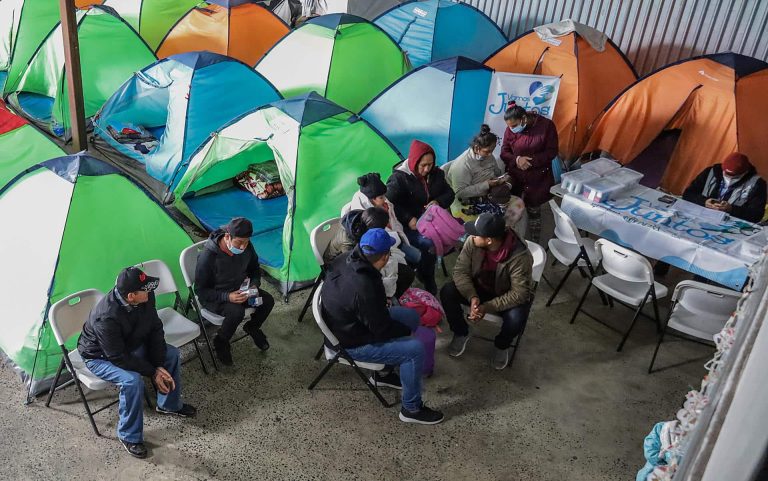7 de enero 2023

Ortega Grants Chinese Company a Huge Mining Concession

PUBLICIDAD 1M
PUBLICIDAD 4D
PUBLICIDAD 5D
“We are going to return despite the fact that the situation in the country is critical due to the dictatorship of Ortega,” says one of the migrants

Central American migrants remain inside the Movimiento Juventud 2000 shelter, in Tijuana, Mexico. Photo: EFE / Joebeth Terriquez
Dozens of Nicaraguan migrants, currently stranded in the southern Mexican state of Chiapas, have begun to return to their country, due to the January 5th changes in US immigration policy, including border control measures, and safe and orderly processes for humanitarian entry.
Some of the migrants, who maintained a camp on the outskirts of the main Chiapas immigration station, began to return to Guatemala, since in Central America they can legally circulate with their Nicaraguan Identity document.
Nicaraguan Joel Hernández, who is traveling with his wife and his daughter, explained that, with the new US immigration provisions, he decided to return to his country along with 50 other compatriots.
“We are returning to our country, because if we enter illegally (into the United States) we will not have anyone who can ask us (receive) there,” he said.
The United States announced on Thursday, January 5, that it will accept a combined 30,000 migrants a month from Nicaragua, Venezuela, Cuba, and Haiti; although, in parallel, the US Administration reported that it will “immediately” expel to Mexico the citizens of those countries who try to cross into its territory irregularly.
Hernandez believes that upon returning to Nicaragua, he will find out about the new measures and will try to carry out the process in his country, because everything has become complicated during his journey.
“We are returning despite the fact that the situation in the country is critical due to the dictatorship of President Daniel Ortega,” he said.
This Friday, more than 1,000 Haitian, Cuban, Venezuelan, Cuban, African, and Ecuadorian migrants organized in lines and were assisted by more than a dozen agents from Mexican Immigration and personnel from the Federal Protection Service, who helped them enter.
Other migrants stay in Mexico
Contrary to the Nicaraguans who are returning home, the Venezuelan migrants who remain in Tapachula and who have learned of the new policy issued by US President Joe Biden, know that the idea of being able to cross irregularly has been complicated. Taking that into account, many have chosen to stay in Mexico and seek their papers to be able to remain. [The new policy affecting Venezuelans was announced separately in mid-October.]
Venezuelan migrant Angel Duviñez pointed out that he does not have anyone to receive him in the United States, so he does not qualify for the program announced by Biden.
He pointed out that his hope is to be able to reach Mexico City, since opportunities are everywhere “and if this country helps us to stay, we can seek work.”
Venezuelan migrants who are stranded on the southern border of Mexico are turning themselves in at immigration stations in order to obtain documents and remain legally in Chiapas.
Meanwhile, the many Haitians who also remain in Tapachula claim to be unaware of the new immigration measures announced by the US government.
Louis Illien, a Haitian migrant, pointed out that, for now, they cannot return to their country, so they are going to continue their journey to the United States.
“If President Biden is going to deport us to Mexico, we will have to endure in this country in order to obtain documents,” he emphasized.
This situation reflects the migratory crisis that the region is experiencing, since during the fiscal year of 2022 the United States registered the detention of 2.76 million undocumented migrants, an unprecedented number.
Nicaraguans, Cubans and Venezuelans led the record number of migration to the United States in 2022. Between January and October, some 147,277 Nicaraguans were detained by the US Border Patrol. This figure exceeds the 87,749 compatriots who turned themselves in to the authorities in 2021.
During 2022, according to data from the Mexican Commission for Aid to Refugees (Comar), Mexico received 118,478 petitions from migrants seeking asylum, the second highest figure after 2021 with 131,448 cases.
This article was originally published in Spanish in Confidencial and translated by Havana Times
PUBLICIDAD 3M
Agencia de noticias internacional con sede en Madrid, España. Fundada en Burgos durante la guerra civil española en enero de 1939.
PUBLICIDAD 3D